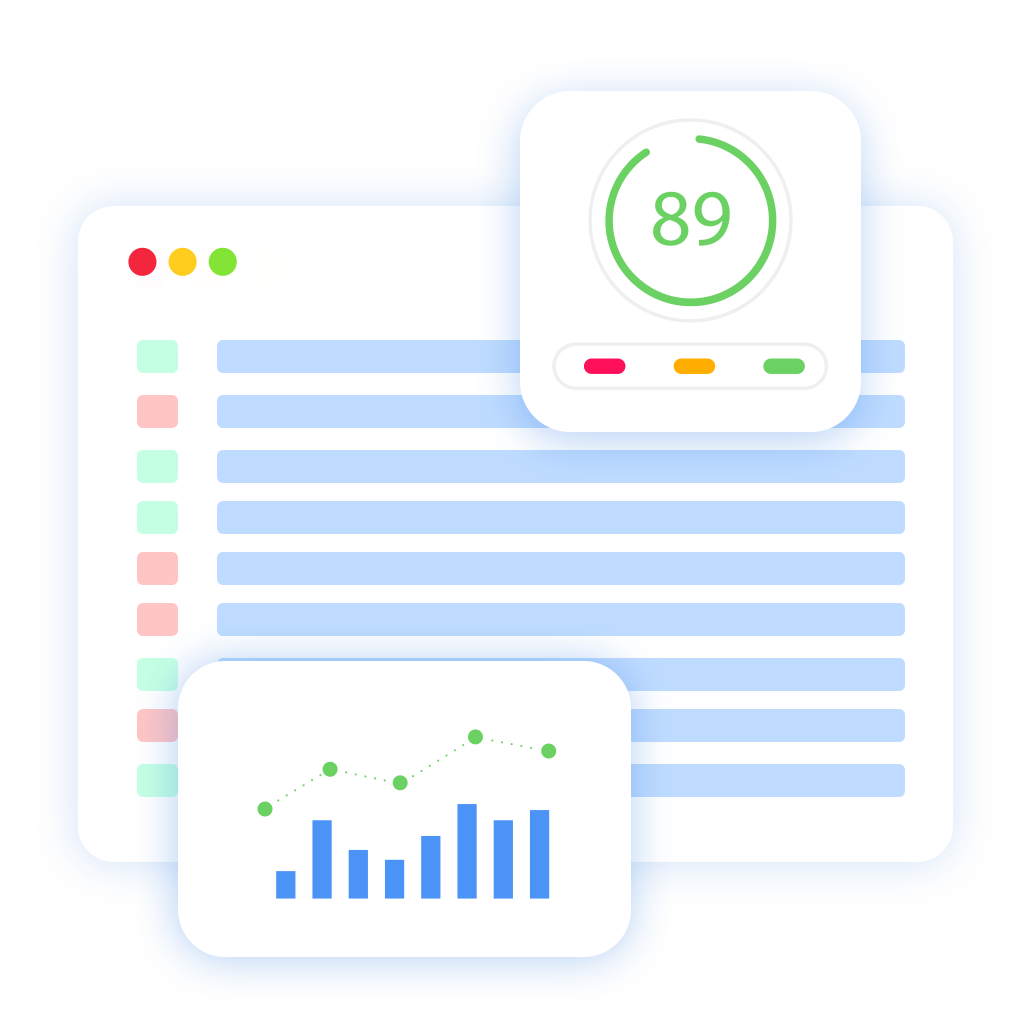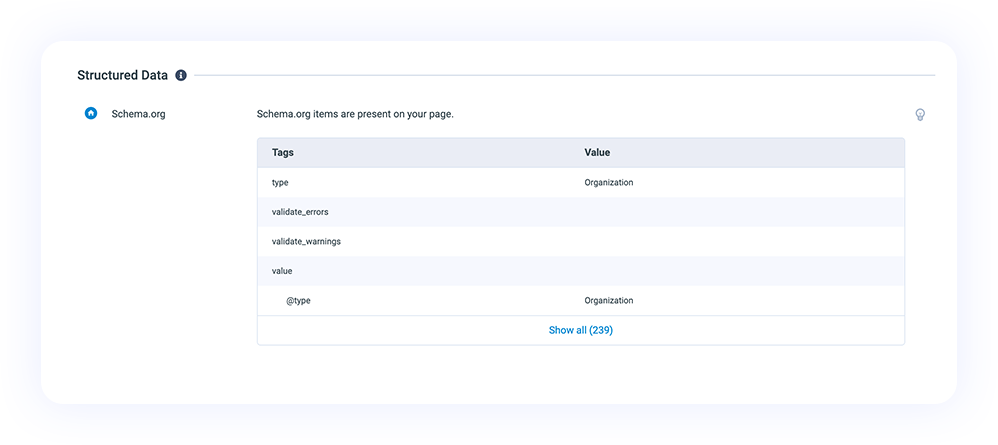
What Is Structured Data?
Structured data is a standard code structure that allows you to give the Google search engine a clue about what your web page is about and gives it the necessary data to classify your content.
You can inform search engines about all the content on your website. Google can know what your content is about and list your website in SERPs directly to users.
For example, let's say you have an e-commerce site that sells dog food. With structured data, you can tell Google that you sell dog food, the product's features and price information. In this case, Google lists the product and price in the SERPs to visitors who want to buy dog food. In this way, the purchasing experience becomes easier and you can appear in front of prospective customers who are willing to buy directly.
Search engine bots understand the content and elements on your website by reading the code and crawling your page. You can provide information about your page and content to search engines with structured data codes.
With a correctly structured data strategy, your website can be listed directly in the rich results. However, if you make a mistake, you can harm your SEO. That's why you need to run regular checks with a structured data controller.

What Is Structured Data Testing Tool?
Structured data testing tool, you can check whether the structured data on your website is correct or not. This tool examines the structured data code structure on your website. You can also test all the structured data on your website and what information it provides to Google.
The doping scheme marking test tool is very practical to use. When you make an evaluation with this tool, you will be directed to a page with detailed analysis results of your website. You can review the analysis results under the Schema.org and Microdata headings in the structured data section here.
You can use the Schema.org section to examine structured data codes. If the codes are correct, you can send the correct codes to search engines.
Microdata are elements that allow you to create metadata for precise adjustments, just like HTML codes. By checking these elements, you can see whether you are using correctly structured data on topics such as activity and product reviews in search engines.

How to Use Structured Data Testing Tool?
Dopinger micro data controller has a practical use. To analyze your website in this tool, type your website's URL in the relevant box on the landing page of the tool. Then press the “Check” button and start the check.
A new tab will open on the screen and you will see that your website is analyzed under many headings. On the main screen, scroll down to the "Structured Data" section. Here, there will be separate review areas for you under the Schema.org and Microdata subheadings. If you examine these sections, you can examine the structured data performance of your website.
If you examine the list in this section in detail, you can see whether your structured data codes are correct and whether there is an error in the structured data fields that allow you to provide information to search engines.
What Can You Do With Structured Data Testing Tool?
Structured data testing tool allows you to check structured data on your website. In this way, you can see whether you provide accurate and sufficient information about the content on your website to search engines.
There are two areas you need to check in the schema markup testing section. These metrics are the Schema.org and Microdata sections. You can analyze all your structured data performance under these two headings.
With Schema.org, you can see whether you are providing structured data with the correct code structure. You can also see all Schema.org structured data codes on your website and what information they provide.
In the Microdata section, you can view product reviews, events, etc. on your website. You can provide information about the contents. In this section you can see the codes provided and what information you have provided about the relevant event or review.

Check Structured Data on Your Site
With structured data testing, you can perform an overall check on all structured data on your website. The first section, under the Schema.org heading, gives information about whether there are Schema.org elements on your website.
If your web page has Schema.org elements, there will be a table right below. This table lists all schema.org tags. What the label is about and what information it contains are listed in the adjacent section. Even if you have hundreds of structured data on your website, you can see it here.
Schema.org codes are codes used to pass structured data to search engine bots. These codes allow you to provide general information about the content to search engine bots. Schema.org platform was jointly developed by search engines such as Google, Yandex, Yahoo and Microsoft. You can add the tags here to your website with coding languages such as RDFa, Micro Data and JSON-LD.
If you add Schema.org tags correctly, your website can be seen in the Google rich results section. You can report many data such as price information, address, working hours, recipe, selected content, reviews to search engines with these tags.
When you review the list, if there is a missing section, you can add the Schema.org tags you need to rank your website more accurately and attract relevant traffic. Thanks to Dopinger structured data checker, you can test all schema structures on your website.

Check Microdata on Your Site
It also allows you to perform Microdata analysis on test schema markup. In the Microdata section, you can see whether you are using special words that will allow you to make the right settings in HTML codes and create metadata that looks natural to machines.
With Microdata Checker, you can send different content such as product reviews, business cards, event information, and publish it by informing search engines about it. When this data is used, the relevant content can be used in software such as Microsoft Outlook, Gmail, Thunderbird, eM Client, Mailbird, where you can manage contacts and calendars.
You can also attract search engine users with location metadata on Google Maps. Therefore, you can make checks in the Microdata field where you can gain gains in terms of both local SEO and general SEO.
By using Microdata, you use HTML codes that will enable search engine bots to find and distinguish the summary information you want to highlight on your web page. In this way, you can give search engines the most accurate information on the page and show your website to your target audience.
Micro data is also important in terms of user experience and easy access to the information they are looking for. Microdata, which are secret HTML tagging codes that you add to your website, also enable search engines to understand your website and classify it correctly.
In this section of the tool, you can see whether there is Microdata on your website. If your website has microdata, it also provides you with a list of all HTML codes. Here you can see what information you have provided, and if you have missing information, you can immediately add it to your website as HTML code.
Other Free Dopinger SEO Tools
Dopinger offers free SEO tools to analyze your websites and create strategies to increase their performance. Here are the tools that we offer that can give a boost to your websites:
Structured Data Testing Tool F.A.Q.
Click the questions to see frequently asked questions and their answers.
Is Structured Data Necessary for My Website?
How to Create Structured Data Codes?
Is the Structured Data Testing Tool Paid?
What Can I See in Structured Data Analysis?
Will the Structured Data Testing Tool Harm My Website?
What Information Should I Provide When Using the Schema Markup Testing Tool?
Can I Download Structured Data Analysis Results?
What Should I Do If My Website Doesn't Have the Structured Data I Want?






